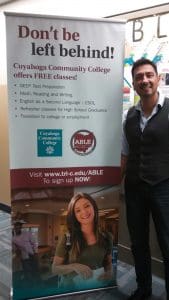In America, there are 36 million adults who cannot read or write at the most basic level. More than 60 million adults lack the basic math skills necessary to work a cash register or understand a bus schedule. Unfortunately, the federal funds budgeted only reaches 1.5 million. Adult Education is an issue that needs to be focused on now.
Next week (September 26 – October 1) is National Adult Education and Family Literacy Week. It is a week to raise awareness about the need and value of adult education and family literacy. This is an opportunity to elevate adult education and family literacy nationwide with policymakers, the media and the community.
The effect that an increase in adult education can have on a community is clear. Adult education gives the low literate and those without basic math skills a chance to find a job, launch a career, educate their own children and live healthier lives. The funding for adult education is a great return on investment; for every dollar invested in those services, a community gets back $60 in decreased welfare costs, tax revenue, and economic activity. It is clear that an increased awareness about the overwhelmingly positive impact of adult education services is needed.
Adult education does not only help low-literate adult to succeed and improve their lives but it also helps their children, families and communities. Children of parents with low literacy skills have a 72% chance of being at the lowest reading level themselves. They are more likely to get poor grades, display behavior problems, have high absentee rates, repeat school years or drop out. By working to increase awareness about the importance of adult education we can put a stop to this cycle.
Communities tend to overlook low-literate adults because their focus is primarily on children. By showing the cascading effect low-literacy in adults has on children and in consequence the community, you help raise attention and prompt action. Showing your community the positive effect increased adult education has on children as well as adults you are able to show your community that supporting adult education is crucial to building a strong and resilient community.
Next week is your chance to get involved. There are a number of ways you can bring attention to this important issue. Do you work with adult learners who have stories of success that you think others need to hear? Do you work for an adult education services agency that has helped change a number of lives? If so this would be a perfect time to share your students’ stories or your agency’s story. Nothing helps spark action more than hearing first-hand how the services have helped someone change their lives.
You can share the stories with our local newspapers, radio stations or news outlets. Develop a pitch and send it out; reporters love to promote individual stories.
Get the attention of local and state officials. Next week you can work with your students on writing letters sharing their stories with their local and state representatives asking for them to ensure that adult education is one of their top priorities. (Find out how to contact your officials and representatives here: https://www.usa.gov/elected-officials). These official’s see facts and figures all the time, putting a face and story to these numbers can help drive home the point of how important adult education is and how it can help citizens succeed and a community thrive. More importantly, your students experience civic engagement and use their writing skills to help themselves and others.
Make our community aware of the issue at hand by writing an op-ed piece. Tell our community why adult education is important, explain how it effects not only adults but children as well, share stories and develop the case for why it needs increased resources and support. A well written piece can spark not only interest but action in the reader.
Another important way to participate in Adult Education and Family Literacy Week is by sharing facts and statistics. Many people are not aware of the issue and don’t understand why funding and resources are needed. Many don’t understand that low literacy skills are directly linked to inequality, high rates of unemployment, lower income and poor health or that adults from poorly educated families are 10 times more likely to have low skills. Most do not know that a mother’s reading level is the greatest determinant to her child’s academic success. COABE and ProLiteracy’s websites have a number of statistics that you can share via your social media or through an email fact sheet. People cannot help increase awareness and thus increase resources and support if they do not understand the problem. You can help enlighten your followers and raise your community’s consciousness about the issue.
Here are some sample tweets you could use next week, be sure to include #AEFLWeek:
Join us for #AEFLWeek (Sept. 26 – Oct. 1) and help raise awareness about the importance of adult education and family literacy.
230 billion dollars a year in health costs is linked to low adult literacy #AEFLWeek
36 million adults cannot read at the most basic level but federal funds only reach 1.5 million of these adults #AEFLWeek
Children of parents with low literacy have a 72% chance of being in the lowest reading level themselves #AEFLWeek.
Literacy benefits adults: Higher salaries, better job opportunities, higher savings & improved working conditions. #AEFLWeek.
435,000 Cuyahoga County adults read at or below a seventh grade level #AEFLWeek
2/3 of Cleveland children are not ready for kindergarten when they enter school. #AEFLWeek
Neighborhoods like Hough, Central & Kinsman have functional illiteracy rates as high as 95% #AEFLWeek
Adult Education and Family Literacy Week is a week to raise awareness in order too leverage resources to support access to basic education for the millions of adults who need it. Next week is a chance for you to raise your voice and to help adult education get the attention and thus the support and resources it needs and deserves.
COABE and ProLiteracy’s websites have some great toolkits and resources to help you to make the most of Adult Education and Family Literacy Week. Also be sure to use #AEFLWeek to connect with a number of agencies and supporters throughout the country and to see how others are celebrating this important week.
 (This week is Adult Education and Family Literacy Week. It is a week to highlight the impact and importance of adult literacy not only on the students but on their families as well. Below is an inspiring story of one adult education student from the Tri-C Aspire program.)
(This week is Adult Education and Family Literacy Week. It is a week to highlight the impact and importance of adult literacy not only on the students but on their families as well. Below is an inspiring story of one adult education student from the Tri-C Aspire program.)
